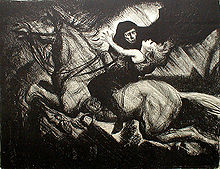Erlkönig (ballad)
Erlkönig is a ballad by Johann Wolfgang von Goethe. He wrote it in 1782. Today, it is among his best-known works.


The work has been set into music many times. Probably the most well-known setting is that by Franz Schubert.
Name
changeOriginally, the work was Danish, called Ellerkonge, which means Elf-king. Johann Gottfried Herder translated it into German. The name Erlkönig came from the fact that elle was translated as Erle.(a tree, called alder, in English). In Danish, elle can mean both alder, and elf.
The legend
changeThe story of the Erlkönig derives from the traditional Danish ballad Elveskud: Goethe's poem was inspired by Johann Gottfried Herder's translation of a variant of the ballad (Danmarks gamle Folkeviser 47B, from Peter Syv's 1695 edition) into German as Erlkönigs Tochter ("The Erl-King's Daughter") in his collection of folk songs, Stimmen der Völker in Liedern (published 1778). Goethe's poem then took on a life of its own, inspiring the Romantic concept of the Erlking. Niels Gade's cantata Elverskud, Op. 30 (1854, text by Chr. K. F. Molbech) was published in translation as Erlkönigs Tochter.
Summary
changeAn anxious young boy is being carried at night by his father on horseback. To where is not spelled out; German Hof has a rather broad meaning of "yard", "courtyard", "farm", or (royal) "court". The opening line tells that the time is late and that it is windy.
As the poem unfolds, the son claims to see and hear the "Erlkönig" (Erl-King). His father claims to not see or hear the creature, and he attempts to comfort his son, asserting natural explanations for what the child sees – a wisp of fog, rustling leaves, shimmering willows.
The Erl-King attempts to lure the child into joining him, promising amusement, rich clothes, and the attentions of his daughters. Finally, the Erl-King declares that he will take the child by force. The boy shrieks that he has been attacked, spurring the father to ride faster to the Hof. Upon reaching the destination, the child is already dead.
Text
change| Literal translation | Edgar Alfred Bowring's translation[1] | |
|---|---|---|
Wer reitet so spät durch Nacht und Wind? |
Who rides, so late, through night and wind? |
Who rides there so late through the night dark and drear? |
Related pages
changeReferences
change- ↑ Johann Wolfgang von Goethe (1853). "The Erl-King". The Poems of Goethe. translated by Edgar Alfred Bowring. p. 99.